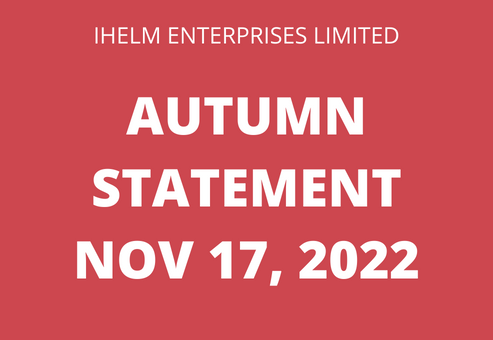On Thursday, November 17th, 2022, the Chancellor, Jeremy Hunt, made several announcements during the autumn statement that will impact businesses and individuals. I have explained some of the items that will impact businesses below.
- All personal income tax allowances and national insurance thresholds have been frozen until 2028. This means that the personal allowance will remain at £12,750 before someone has to pay tax until April 2028. What this does mean though, is that as a person’s salary rises above the personal allowance or the relevant tax threshold, they will start to pay tax, whereas, in previous years, the personal tax allowance has usually increased each year, which would reduce the chances of this happening.
- The threshold for the highest tax bracket (45%) will be reduced from £150,000/year to £125,140/year from April 2023. This will mean people who earn over £125,140 will no longer pay 40% tax on their income, but 45%.
- The current National Insurance Employment Allowance of £5,000 will continue to be available which will help businesses reduce what they need to pay for National Insurance.
- The tax relief on Research and Development is being lowered to 10% from April 2023 which may discourage businesses from investing in this area.
- Businesses, and individuals, that invested in electronic vehicles will have to start paying Road Tax from April 2025.
- The National Living Wage for those over 23 years old will rise from £9.50/hour to £10.42/hour from April 2023. This will affect many businesses as there will be a significant increase in their wage expenses – especially in sectors where the hourly rate is usually low.
- The dividend allowance will be lowered to £1,000 in April 2023 and then to £500 from April 2024. This will mean that those shareholders and directors who take dividends will have to start paying tax on them at a much lower amount than before.
- The VAT threshold of £85,000 will remain until March 31st, 2026.
- The Corporation Tax increase to 25% from April 2023 has been put back into action. This affects businesses with profits over £250,000. Businesses with profits of up to £50,000 will be able to use the “small profit rate” of 19%.
- The annual Capital Gains Tax exemption amount will be lowered to £6,000 from April 2023 and then to £3,000 from April 2024.
- Business Rates:
– business rates across England will be updated to reflect changes in property values
– business rates multipliers will be frozen in 2023/2024
– bill increases for ratepayers will be capping any increases caused by changes in rateable values at the 2023 revaluation
– support for any eligible businesses in retail, hospitality and leisure is being extended and increased to 75% business rates relief (capped at £110,000 per business) from April 2023
– any business that has lost eligibility or seen reductions in the Small Business Rate Relief or Rural Rate Relief will be capped at £600/year
– if a ratepayer makes qualifying improvements to a property they occupy, they will not see an increase in their rates for 12 months from April 2024 to 2028
There is a lot more to the Autumn Statement, but I have covered the main points that will affect businesses of all sizes.
You can read more about the Autumn Statement here: https://www.gov.uk/government/publications/autumn-statement-2022-documents/autumn-statement-2022-html

